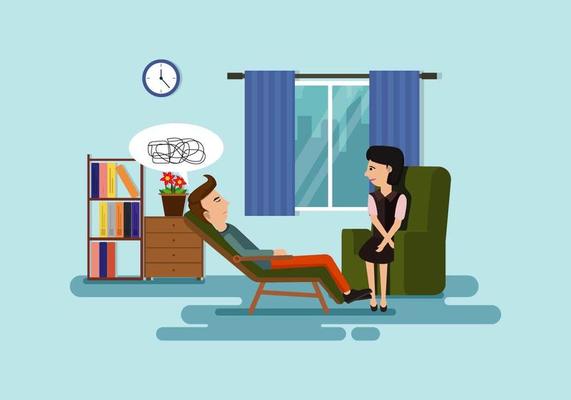What to Anticipate When Checking Out the Best Psychologist in Delhi for Therapy
What to Anticipate When Checking Out the Best Psychologist in Delhi for Therapy
Blog Article
The Function of Psych Treatment in Handling Stress And Anxiety and Clinical Depression
Psychiatric therapy has actually become a keystone in the monitoring of stress and anxiety and anxiety, using customized interventions that range from Cognitive-Behavioral Therapy (CBT) to mindfulness-based approaches. These techniques not only aid people in recognizing and reorganizing unfavorable thought patterns but also foster present-moment recognition, lowering the propensity to ponder. As we check out the various dimensions of psychiatric therapy, it ends up being obvious that these techniques do greater than just alleviate signs and symptoms; they significantly boost psychological policy and interpersonal abilities - Best Psychologist in Delhi. What remains to be checked out is just how these restorative techniques can be efficiently customized to satisfy private needs, consequently enhancing their influence.
Understanding Anxiousness and Depression
Recognizing anxiety and anxiety calls for a comprehensive look at these widespread psychological health conditions, which commonly exist together and significantly impact an individual's everyday life. Anxiousness is identified by persistent, excessive concern and are afraid concerning day-to-day scenarios. Symptoms include restlessness, fast heart rate, and problem concentrating. On the other hand, clinical depression shows up as a prevalent sensation of emptiness, hopelessness, or sadness, usually come with by a loss of passion in formerly taken pleasure in tasks, modifications in appetite, and sleep disturbances.
The coexistence of anxiousness and depression can complicate and aggravate signs medical diagnosis and therapy. Individuals struggling with both problems might experience much more extreme symptoms, higher impairment in occupational and social functioning, and a much longer period of disease. This comorbidity demands a nuanced understanding and approach to treatment.
Cognitive patterns like unfavorable reasoning and maladaptive actions can bolster these problems. Comprehensive analysis by psychological wellness specialists is crucial to discern the presence and extent of these problems, leading the means for customized healing approaches.
Kinds Of Psychiatric Therapy
Psychiatric therapy, additionally called talk treatment, includes a variety of treatment modalities designed to alleviate symptoms of anxiousness and clinical depression by resolving the underlying emotional and psychological concerns. Various sorts of psychotherapy are customized to fulfill the special requirements of individuals, providing a range of approaches to psychological healthcare.
One extensively made use of form is psychodynamic therapy, which concentrates on understanding and dealing with unconscious problems originating from early life experiences. By exploring these deep-rooted problems, clients gain understanding into their current actions and emotion.
Social Treatment (IPT) is another reliable modality that focuses on enhancing interpersonal partnerships and social working to reduce depressive signs. It generally resolves problems such as grief, function transitions, and social disputes.
Humanistic therapies, such as Client-Centered Treatment, emphasize individual growth and self-actualization. Best Psychologist in Delhi. These techniques create an encouraging environment where individuals can discover their sensations and create a stronger feeling of self
Lastly, Dialectical Behavior Modification (DBT) integrates cognitive-behavioral strategies with mindfulness techniques. Originally created for borderline personality condition, DBT has actually been adapted to treat stress and anxiety and clinical depression by teaching skills in distress resistance, psychological policy, and social performance.
These diverse psychotherapeutic methods supply multiple pathways to mental wellness and well-being, providing to specific preferences and restorative requirements.
Cognitive-Behavioral Treatment (CBT)
Amongst the various psychotherapeutic modalities, Cognitive-Behavioral Therapy (CBT) sticks out for its organized, ambitious approach in treating anxiety and clinical depression. Developed by Aaron T. Beck in the 1960s, CBT is asserted on the idea that maladaptive reasoning patterns add dramatically to emotional distress and behavioral issues. By identifying and restructuring these negative thought patterns, CBT aims to reduce symptoms and foster healthier cognitive processes.
CBT is normally temporary, covering 12 to 20 sessions, and includes a collective effort between therapist and patient. The treatment incorporates a selection of strategies, consisting of cognitive restructuring, exposure therapy, and behavioral activation. Cognitive restructuring concentrates on testing and customizing distorted cognitions, while exposure therapy progressively accommodates individuals to anxiety-provoking stimuli, decreasing avoidance behaviors. Behavior activation looks for to enhance engagement in rewarding tasks to combat depressive states.
Empirical evidence underscores the efficiency of CBT, with various studies showing its effectiveness in lowering signs of anxiety and clinical depression. This therapeutic strategy has been adjusted for different populaces and settings, confirming flexible and versatile. Its structured nature, empirical assistance, and concentrate on ability acquisition make CBT a foundation in the psychotherapeutic treatment of stress and anxiety useful reference and depression.
Mindfulness-Based Strategies
Mindfulness-Based Techniques have actually garnered considerable focus in recent times as efficient treatments for stress and anxiety and clinical depression. Rooted in ancient meditation techniques, these strategies aim to cultivate an increased recognition of the present moment, which can assist people disengage from the ruminative thought patterns commonly connected with stress and anxiety and depressive conditions.

Similarly, Mindfulness-Based Cognitive Therapy (MBCT) integrates principles from Cognitive-Behavioral Therapy (CBT) with mindfulness strategies. MBCT is particularly effective in avoiding relapse in individuals with frequent clinical depression. By acknowledging very early warning indications of depressive episodes, individuals trained in MBCT can apply mindfulness practices to minimize the start of full-on episodes.
Advantages of Psychotherapy
Countless research studies have shown the profound advantages of psychotherapy for individuals grappling with anxiousness and anxiety. Psychiatric therapy gears up individuals with coping strategies to handle stressful emotions, consequently decreasing signs and symptoms of stress and anxiety and clinical depression.
Additionally, psychotherapy supplies an organized setting for self-exploration and insight. By discussing their experiences and feelings with an experienced specialist, individuals can reveal underlying issues adding to their mental health and wellness battles. This self-awareness is a critical step towards lasting recovery and durability.
An additional significant advantage is the improvement of interpersonal skills. Anxiousness and depression typically stress relationships, causing seclusion. Through restorative treatments, people learn efficient interaction and conflict-resolution abilities, which can improve their interactions click resources and foster helpful partnerships.
Additionally, psychotherapy provides a customized method to treatment. Ultimately, the advantages of psychiatric therapy expand beyond sign alleviation, adding to overall well-being and high quality of life.

Verdict
Psychotherapy significantly contributes to the monitoring of stress and anxiety and depression by offering reliable coping methods and a protected environment for self-exploration. Methods such as Cognitive-Behavioral Therapy (CBT) and mindfulness-based techniques contribute in recognizing and reorganizing negative idea patterns, while promoting present-moment recognition. These customized treatments not just alleviate symptoms but likewise enhance psychological regulation and social abilities, thus improving overall well-being and lifestyle for people dealing with these psychological health challenges.
Psychotherapy has actually arised as a foundation in the management of anxiousness and depression, providing tailored treatments that range from Cognitive-Behavioral Therapy (CBT) to mindfulness-based strategies.Recognizing anxiousness and anxiety requires a thorough look at these prevalent psychological wellness conditions, which frequently coexist and dramatically effect an individual's day-to-day life.Among the numerous psychotherapeutic techniques, Cognitive-Behavioral Treatment (CBT) stands out for its structured, goal-oriented method in dealing with stress and anxiety and anxiety.Various researches have actually demonstrated the profound advantages of psychotherapy for people grappling with anxiety and anxiety. Psychiatric therapy gears up people with coping methods to manage stressful feelings, thus minimizing signs and symptoms of stress and anxiety and clinical depression.
Report this page